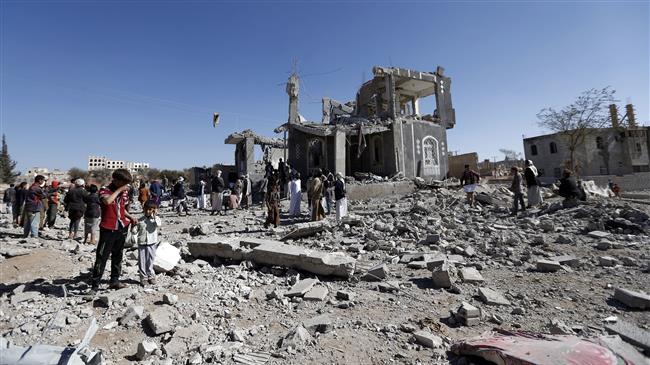Fresh Saudi airstrike leaves nearly two dozen civilians killed in SW Yemen
Nearly two dozen civilians have lost their lives when Saudi fighter jets launched an aerial attack in Yemen’s southwestern province of Ta’izz as the Riyadh regime continues with its bombardment campaign against its impoverished neighbor.
Local sources, speaking on condition of anonymity, told al-Masirah television network that Saudi warplanes targeted a vehicle as it was travelling along a road in the al-Arish of Mawza district on Friday afternoon.
The sources added that 20 people were killed in the airstrike.
Earlier in the day, three houses were reduced to rubble in the al-Dhaher district of the mountainous northwestern province of Sa’ada, when Saudi military aircraft carried out three airstrikes against the area.
Also on Friday, Yemeni army soldiers and allied fighters from Popular Committees fired a domestically-manufactured ballistic missile at an airport in Saudi Arabia’s southwestern border region of Jizan in retaliation for the Saudi regime’s military campaign against their crisis-hit country.
A military source, speaking on condition of anonymity, told Yemen’s Arabic-language al-Masirah television network that the Badr-1 missile struck Jizan Regional Airport, also known as King Abdullah bin Abdulaziz Airport, with great precision.

The Yemeni Ministry of Human Rights announced in a statement on March 25 that the Saudi-led war had left 600,000 civilians dead and injured since March 2015.
The United Nations says a record 22.2 million Yemenis are in need of food aid, including 8.4 million threatened by severe hunger.
A high-ranking UN aid official recently warned against the “catastrophic” living conditions in Yemen, stating that there was a growing risk of famine and cholera there.
“After three years of conflict, conditions in Yemen are catastrophic,” John Ging, UN director of aid operations, told the UN Security Council on February 27.
He added, “People's lives have continued unraveling. Conflict has escalated since November driving an estimated 100,000 people from their homes.”
Ging said cholera had infected 1.1 million people in Yemen since last April, and a new outbreak of diphtheria had occurred in the war-ravaged Arab country since 1982.
Iran’s economy grew 2.7% y/y in Sep quarter: CBI
VIDEO | Freelancers in Gaza strive to stay online amid genocide
Mikati demands Israel's withdrawal from south Lebanon
Yemeni army strikes Israeli military sites with drones
‘Clock ticking’: UNRWA slams unjustifiable killing of children in Gaza
BP to be sued in Britain for supplying oil to Israel
VIDEO | Press TV's news headlines
Israeli strikes on north Gaza hospital ‘extremely dangerous, terrifying’: Director



















 This makes it easy to access the Press TV website
This makes it easy to access the Press TV website